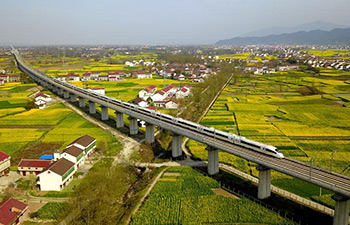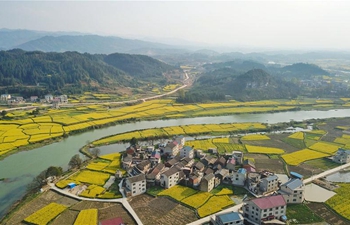CHANGSHA, March 21 (Xinhua) -- A central Chinese province has stopped operation of 34 hydropower plants and demolished 10 dams in the past two years in a key reserve of giant salamanders, the world's largest existing amphibian.
Municipal officials of Zhangjiajie said they planned to demolish most of the 88 hydropower plants, mainly small ones built before the establishment of the National Giant Salamander Nature Reserve.
"Only those that provide important flood control, irrigation and water supply responsibilities will be retained," said Hu Shenghu, head of the city's water conservancy bureau.
Officials and conservationists have blamed the hydropower plants for blocking and fragmenting rivers, hindering fish migration and reducing prey and habitats for the rare amphibians.
"We plan to dismantle all dams that only have power-generating functions in the reserve before the end of 2020 and reevaluate the functions of the rest," Hu said.
The decision to close the hydro projects, which came in 2017 in concord with China's pursuit of a greener path of development, has been hailed as a milestone for habitat restoration of giant salamanders, which date back 350 million years to the age of the dinosaurs.
"A MORE COMFORTABLE LIFE"
Giant salamanders are commonly known as "baby fish" in China as their cries, according to legends, resemble that of a human baby; though in reality, they lack vocal cords to cry out. They are under state protection in China, threatened by habitat loss and consumption of their meat.
Liang Zhiqiang, an associate researcher at the Hunan Fisheries Science Institute, said giant salamanders like to inhabit caves with flowing water. They usually go out for small fish at night and return before dawn, so the factitious barriers in rivers, such as dams, could hinder their foraging.
"When the dams are gone, giant salamanders can live a more comfortable life," Liang said.
Deng Zhiyong, head of the protection unit of the reserve, said the removal of the dams will also benefit the entire ecosystem.
"It is not simply about the species but also its habitat. Only when its suitable ecological environment is preserved, can giant salamanders survive in the long run," Deng said.
To protect the species, now held as an icon and mascot of Zhangjiajie, the local government said they stopped all sand dredging activities in the reserve and tore down river blocks to increase water flow.
As 89.1 percent of Sangzhi county's water area is in the reserve, Gu Guosheng, director of the county's water conservancy bureau, said they often communicated with the affected communities before demolishing a dam.
To their relief, Gu said most locals chose to support their decision.
"Many locals agreed that protecting the environment is not only about our generation but also good for future generations," Gu said.



















